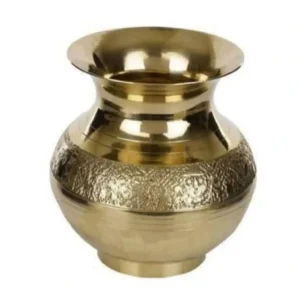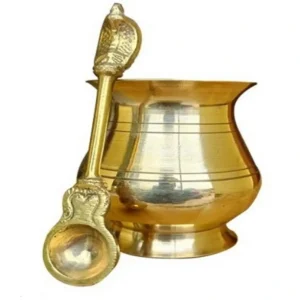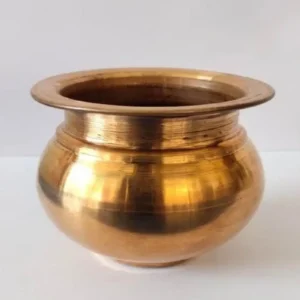
Discover Quality Puja Samagri Online

Discover Quality Puja Samagri Online
Lota/Kalash
Showing all 3 results
-

Brass Kalash Lota for Puja Set of 1
₹329.00 -

Brass Puja Lota with Spoon
₹449.00 -

High Quality Copper Puja Lota Kalash
₹399.00
Pooja lota or kalash is a sacred vessel that is an important part of Hindu rituals and ceremonies. It is a symbol of purity and represents the female principle of creation. A puja lota is usually made of brass or copper and is decorated with intricate designs. In this article, we will explore the different types of pooja lota/kalash and their significance in Hinduism.
Different Types of Pooja Lota/Kalash:
1. Copper Lota/Kalash:
Copper is considered a sacred metal in Hinduism and is believed to have healing properties. A copper kalash is used in many Hindu rituals and is believed to bring blessings to the household. It is also used in Ayurveda to store water overnight which is believed to have several health benefits. Copper kalash is considered auspicious and is used in the worship of several Hindu deities.
2. Silver Lota/Kalash:
Silver is another sacred metal in Hinduism and is associated with the moon. A silver kalash is used in many Hindu rituals and is believed to bring peace and prosperity to the household. It is also used in the worship of several Hindu deities especially during the Navratri festival. A silver kalash is considered to be a symbol of wealth and is often given as a gift during weddings and other auspicious occasions.
3. Brass Lota/Kalash:
Brass is a popular metal used in the making of puja lota/kalash. A brass kalash is often used in the worship of Lord Ganesha who is believed to bring good luck and prosperity to the household. It is also used in the worship of other Hindu deities and is considered to be a symbol of purity and divinity.
4. Clay Lota/Kalash:
A clay kalash is made from terracotta and is often used in the worship of Mother Earth. It is believed to be a symbol of fertility and is used in several Hindu rituals. Clay kalash is also used in the worship of Lord Shiva and is considered to be a symbol of purity and devotion.
5. Bronze Lota/Kalash:
Bronze is a popular metal used in the making of puja lota/kalash. A bronze kalash is often used in the worship of Lord Vishnu who is believed to bring peace and prosperity to the household. It is also used in the worship of other Hindu deities and is considered to be a symbol of purity and divinity.